Blues
Reviews
Dec 2017/Jan 2018
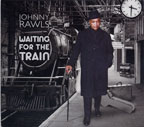 Johnny
Rawls
Johnny
Rawls
“Waiting For the Train”
Deep South Soul Records
www.catfoodrecords.com
Johnny Rawls honed his southern soul in the ‘70s cutting his teeth
as guitarist and bandleader for OV Wright and in the ‘80s filled
the same role for Little Johnny Taylor’s band. He’s perfected
his crowd-pleasing soulful sound through years on the road and shares
a Blues Trail Marker with Tyrone Davis and Little Milton in Hattiesburg,
Mississippi. His newest release on his own Deep South Soul Records “Waiting
For the Train” features six originals out of the ten tracks and
he augments that rich soul sound with rockin’ rhythm & blues
and a touch of gospel. Rawls works with his solid band, The Rays, that
include his co-writers Bob Trenchard on bass and Dan Ferguson keyboards
along with guitarist Johnny McGhee, Richy Puga on sticks, a four piece
horn section of Andy Roman and Nick Floodon on saxes, Mike Middleton trumpet,
Joel Chavarria trombone and the backing vocals of Janelle Thompson and
Shakara Weston.
Beginning with a raft of originals, the piano rolls like thunder and hurricane
force horns blast while Johnny’s powerful vocals build the momentum
as he preaches and proclaims “Rain Keep Falling (Til I’m Free)”.
Then they swing into “Las Vegas” with flashy horns, backing
vocals and clever lyrics that blends the belief that your really gonna
win with your belief in Jesus, but the devil is in the details and “Blackjack
Was A Gambler” tells a darker side of gambling with the tale of
the notorious Jack and Sally. A good soul album wouldn’t be complete
without a couple of romantic love songs in the mix as Rawls pleads he’ll
warm your heart and wash away the pain if you’ll just “Stay
With Me.” Then Rawls is happy as a man can be covering Bobby Womack’s
“I’m In Love” and the celebration continues with Syl
Johnson’s “We Did It” cause he’s made some mistakes
but he had what it takes. The celebratory mood continues with a funky
burst of horns and throbbing bass line as your hips sway to the “California
Shake.” Shaking a tambourine, the band takes on a gospel feel on
Leo Graham’s “Turning Point” as Johnny testifies that
his sweet thing turned him around and saved his soul. Slowing down to
a modern gospel mood with angelic backing vocals Rawls soulfully sings
how everyone is “Waiting For The Train” while the crisp guitar
rings out every note with chilling clarity. Then Johnny’s warm vocals
with subdued keys builds in intensity as the band slowly joins in adding
backing vocals, guitar and finally muted horns for a truly heartfelt cover
of the Dylan classic “I Shall Be Released.”
Johnny Rawls has blended old school soul, funky rhythm and blues and wrapped
it all into the fold of gospel with his new CD “Waiting For The
Train” and has just the right ticket to keep him on track. —Roger
and Margaret White
 Kelly
Z At SlideAway Studio
Kelly
Z At SlideAway Studio
Rescue
KellysLot.com
Singer/songwriter Kelly Z and her band have been an L.A. mainstay for
more than twenty years. She was looking for a new project when her producer,
Chuck Kavooras, rediscovered these tracks that he’d recorded in
2011 but never finished. He brought them to Kelly and they realized the
songs were too good to sit in a box and decided to “Rescue”
them. These are all cover tunes so too were they rescuing the songs themselves
from the abyss of forgotten tunes, or rescuing the performances from that
bin. This killer band is Kelly “Z” Zirbes vocals, John Marx
guitar, Mo Beeks keyboards, Rick Reed bass, Bryan Head drums, Andy Najera
sax, Stan Martin trumpet, a trio of her L.A. soul sisters on backing vocals:
Teresa James, Shari Puorto and Lisa Orloff Staley, with a few other guest
players. Each song is its own surprise as you realize you know that song
and wonder who did it first.
Ripping in with a roar of funk on James Brown & Marva Whitney’s
“What Do I Have To Do” Miss Z just has to do the do and stay
on the good foot too as the horns and organ wail behind the girls. Mellowing
with the Bacharach / David “Baby It’s You” a hit for
the Shirelles but covered by the Beatles, the hesitant rhythm and the
quiver in Kelly’s voice adds to the anticipation till she breaks
through in full voice. “You Don’t Realize,” a Mike Bloomfield
tune from the Electric Flag, which carried the note “Dedicated with
great respect to Steve Cropper and Otis Redding” on the original
was sung by Buddy Miles and Kelly tries a little tenderness and has Barry
Goldberg from the Flag playing B3 organ. Two Ike & Tina Turner tunes
“It’s Gonna Work Out Fine” featuring male vocals by
her songwriting partner Perry Robertson and “Trying To Find My Mind”
with Chuck Kavooras adding a killer slide guitar. “He Called Me
Baby” was originally sung by Patsy Cline in 1963 but here Kelly’s
strong soulful take is closer to the cover by Candi Staton done in 1971.
“Do Your Thing” written and performed by Isaac Hayes before
he hit his Hot Buttered Soul era, shortened from its original nineteen
minute length that has a restrained tension giving it an extra edge. The
biggest surprise is a classic country tune “You Are My Sunshine”
first released by the Pine Ridge Boys in 1939 reinvented as a soul ballad
with hard rocking horns as Kelly’s vocal soars through like a breaking
dawn.
Kelly Z is calling her new disc a “Rescue” but it sounds as
fresh as anything out today which may be it’s real redemption.—Roger
and Margaret White
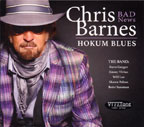 Chris
“Bad News” Barnes
Chris
“Bad News” Barnes
Hokum Blue”
Vizztone Records chrisbarnesnyc.com
Chris Barnes had been on the NYC scene for decades with an impressive
resume of writing and performing credits. On his second blues release
Barnes combines his comedic and vocal talents presenting fourteen Prohibition-era
songs with humorous, sometimes raunchy, perspectives known as “Hokum
Blues” - originally written and performed by Tampa Red and Big Bill
Broozy. Backed by a band of A-list musicians including Jimmy Vivino from
Conan O’Brien on guitar, Will Lee of David Letterman’s Orchestra
on bass, Shawn Pelton from Saturday Night Live on drums, Bette Sussman,
Bette Midler’s piano player and Steve Guyger from the Jimmy Rogers
Blues Band blowing harp. Filling out this jamboree is the ragtime style
horns of Steve Bernstein, trumpet, Charlie Pillow on sax and clarinet
with Clark Gayton’s trombone.
Kicking off with a drum roll and tinkling piano on Tampa Red’s “It
Hurts Me Too” resonating like Vivino’s guitar and Guyger blows
some mournful harp, if you close your eyes you’re transported to
a classic speakeasy. The keys bounce and backing vocals join in the playful
innuendo of “Let Me Play With Your Poodle” and taking a more
sultry tone as muted trumpet and clarinet tickle your fancy when Barnes
begs “Let Me Pat That Thing” and he explains the consequences
when they “Caught Him Doing It.” With Sussman showing off
her piano skills, the horns blow some blunt notes while Barnes echoes
Jolson on “I’m Gonna Get High” and you realize today
isn’t too different from the ‘30s. Then Barnes warns of the
“Gin Mill Blues” and everyone indulges in the intoxicating
“You Can’t Get Enough Of That Stuff.” With a funky feel
Barnes gruffly belts out “It’s Tight Like That” while
the guitar slides in and out between verses against a squealing harp.
A slippery trombone holds the pace as Jimmy works a banjo and Barnes mimics
Eddie Cantor, explaining why “I Had To Give Up Gym.” Barnes’
heartfelt vocals command attention against down-home harp and slide guitar
on “Things About Coming My Way” and following form with a
soft-shoe rhythm, “Hokum Blues” shows sometimes you gotta
laugh to keep from crying. You may find yourself singing along on the
chorus of “Somebody Been Using That Thing” as you get lost
in the haunting vocals, harp and muted horns, then you’ll sashay
around the room to the Latin rhythm and Guyger’s faux trumpet of
“Keep Your Mind On It.” There is no sadder time to have the
blues than the holidays as Vivino’s slide cries and Barnes moans
his bad news on Tampa Reds’ “Christmas and New Year’s
Blues.”
“Bad News” Barnes has renewed these timeless melodies with
the near forgotten style of 1930’s vaudeville and speakeasy classics
for today’s audiences. As W.C. Handy said, “You gotta hook
‘em with the Hokum!” and Barnes delivers with “Hokum
Blues.”—Roger & Margaret White
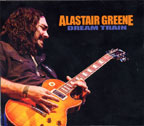 Alastair
Greene
Alastair
Greene
Dream Train
Rip Cat Records alastairgreene.com
Music was always a part of his life, his mom had a great record collection
and his grandpa’s big band experience gave him the spark to attend
the Berklee College Of Music which lit the flames of his true passion.
Returning home Greene’s been known on the West Coast blues scene
for decades and was in the Delta Groove stable of top players. For the
last seven years he’s been playing with the stars rather than in
greasy bars as part of the Alan Parsons Project Live. Now sporting long
hair and rocker’s attitude, Greene is blazing a blues/rock trail
with his latest CD “Dream Train.” Writing almost all the songs
and produced by David Z, he’s assembled his own dream team of drummer
Austin Beede, bassist Jim Rankin and hooked up a few friends including
Walter Trout, Debbie Davies, Mike Zito, Mike Finnigan and Dennis Gruenling
to get the train rolling.
Taking off on this rocky ride a hard beat drives the music as Greene’s
grind of guitar pushes us towards the Promised Land on “Dream Train.”
The boogie of “Big Bad Wolf” is gruff, fast and muscular with
a deceptive sweetness on the vocals to lure you in to be snatched up and
dragged away by the blazing guitar attack. An unreleased Billy Gibbons
rarity, “Nome Zayne,” asks the drunken rhetorical question
“know what I’m saying” as it oozes ZZ Topness. Walter
Trout and Green trade some hot, soul bearing licks, each with their own
distinct voice, as Finnigan’s B3 purrs in the background allowing
Alastair to pour his heart out in the vocals of “Another Lie.”
A hard beat announces the hard rock anthem “I’m the Taker,”
while the “Daredevil” pits Greene’s guitar against Finnigan
on organ and Gruenling’s harp as each jump into this tag team ring.
The pounding rhythm of “Rain Stomp” has gusts of slippery
slide, then Greene struggles with a darker mood to keep his “Demons
Down.” Crushing riffs breaks into dueling guitars with Mike Zito
on slide as they make their way “Down To Memphis” where Greene
strikes some spritely licks warning that the natural born queen of “Lucky
13” is just a nightmare waiting to happen. Taking a break from the
heavy beats with two instrumentals, “Song For Rufus,” a light
acoustic guitar nimbly tracing a path then scampers along, is dedicated
to his feline buddy, Rufus, while a gentle guitar warm like a sunny day
with the organ drifting in the background like a near forgotten breeze
blowing through reflected memories of his grandmother in “Iowa.”
The big beat returns on the instrumental “Grateful Swagger,”
featuring Debbie Davies’ guitar, the leads range from chicken scratching,
to a “Tramp”-like gait, to a full slash and burn.
Alastair Greene’s journey on “Dream Train” travels some
rocky tracks that drive these blues home. —Roger & Marga
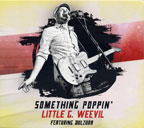 Little
G. Weevil
Little
G. Weevil
Something Poppin’
Vizztone Records gweevil.com
I’d heard of Little G. Weevil as a fine acoustic blues man but what
I found was not what I’d expected. Born Gabor Szucs in Budapest,
Hungary, a drummer/guitarist who had his first blues band by 2000 but
moved to the blues motherland, USA, in 2004 settling in Atlanta GA. Hitting
the jams he was dubbed Little G. Weevil because, “like a damn weevil,
he just popped up everywhere!” This led to him representing the
Atlanta Blues Society at the 2013 IBCs where he won Solo/Duo and Best
Guitarist. He’s since released two acoustic CD’s but “Something
Poppin” is Weevil’s first band album in five years and this
is definitely a whole different thing. It’s a throw back to 70’s
soul, reminiscent of Curtis Mayfield with Little G.’s vocals a cross
between Rick Estrin, Kim Wilson and Leon Redbone. Recorded in Budapest,
Hungary the only American player is G.’s drumming partner, Daniel
Harper from Atlanta, while the remaining players are Marton Pfeff, bass,
Matyas Premecz on Hammond organ and Fender Rhodes piano, Danny Del Toro
of Madrid on harmonica with Rebeka Easley Ellis and Sharika Allen Brown
backing vocals.
Rolling like a train close to jumping off the tracks, “Here I Come
Knocking,” it’s banging drums against the blast of harp, B3
and piano as the guitar whines behind incessant vocals then easing into
a shimmering Rhodes, chanting female vocals and a jazzy guitar sounding
like another voice, it’s Little G.’s gruff vocals that nail
it on “Something Poppin’.” Slipping back to a foot stomping
acoustic guitar and harp on “See Me In The Country” he breaks
that mold with funky wah wah and keys taking it back to town. Slowing
to a soulful sway this tale of lost love, “How You Want Me To Deal
With This” features a mellow Rhodes, an urgent vocal and guitar
expressing his pain, then stepping up the pace he strongly answers “You
Can’t Say Nothing” with a bouncing B3, female vocals wailing
along side as Mr. G.’s funky guitar chimes in. Weevil’s commanding
vocal jumps to the fore as Laci Borsodi handles the guitar leads on “Crawling.”
The gentle ballad “I Don’t Want To Feel The Rain,” feels
like summer showers as Weevil’s words fall like tears with angelic
backing vocals, though the guitar has hints of distant thunder. Bringing
things back with the rolling thunder of drums, organ and guitar, the upbeat
“Top Model,” would fit into a J. Geils set till Borsodi blasts
out a Chuck Berry-laced solo. The only cover is Curtis Mayfield’s
“Pusherman” from the “Super Fly” sound track.
Here it’s given a harder edge with softer guitar and keys floating
on the periphery. As a variant to the rest of the CD, “Scrub”
features Dutch/Aruban rapper Dulzura reflecting on a world music sound.
With his new CD “Something Poppin’” there ain’t
nothing little about Little G. Weevil.—Roger & Margaret White
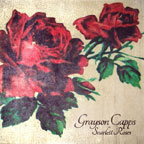 Grayson
Capps
Grayson
Capps
Scarlett Roses
Royal Potato Family CD
Singer/songwriter Grayson Capps first emerged as a solo artist a dozen
years ago—following spells in the New Orleans-based, energetic thrash-folk
band the House Levelers and the blues-rock oriented group, Stavin’
Chain. This nine track project is the now Alabama-based musician’s
sixth studio recording and his first release in six years. Co-produced
by his Grammy Award winning producer-engineer and longtime partner, Trina
Shoemaker, the dream-like, atmospheric narratives deal with weighty issues
on the order of separation, the mortality of one’s parents, self-medication,
the exigencies of fatherhood, the aging process and having the funky blues.
Back porch favorites around my hacienda include the Drive By Truckers-esque
“Bag Of Weed,” a bluesy “Hold Me Darlin” (inspired
by an afternoon finger-picking a la Mississippi John Hurt) and an advisory
called “You Can’t Turn Around.” Also noted is the engaging,
trance-like title track, the bleak commentary “Moving On”
and the sunshine drenched “Thankful.” Capps and resilient
crew are currently on tour in Europe. Gadzooks!—Gary von Tersch
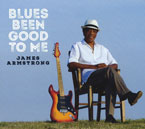 James
Armstrong
James
Armstrong
Blues Been Good to Me
Catfood Records 2017
By now many of us know James Armstrong’s inspiring saga: he was
on the rise of a burgeoning career when interrupted gruesomely by injuries
to his left arm in a home robbery, the injuries subsequently surmounted
by diligence and will until he has re-assumed his place in the list of
top contemporary bluesmen.
His third release for Catfood Records finds Armstrong in fine form. The
relatively brief set of ten tunes, eight penned by Armstrong, lasts just
under forty minutes, but it’s high quality. The principal is backed
by a strong ensemble behind his savory guitar leads and tenor vocals.
Track one, the title tune, sets the stage: it’s a zippy shuffle
with crisp guitar. “The Second Time Around,” appropriately
the second cut, playfully deploys the main riff from Johnny Rivers’
version of “Secret Agent Man” from 1966. The ensuing “Addicted
to Love” is another shuffle, distinguished by some tuneful piano
from Matt Murdick and pleasing backing vocals by Amy Slack and Kimberlie
Helton.
“Early Grave,” one of my favorite tracks, is introduced by
Murdick again, and develops its theme around references to the premature
departures of Elvis Presley and Robert Johnson. There are unmistakable
echoes of Robert Cray in the track, which is a compliment: Armstrong can
do soul blues more than competently.
“Old Man in the Morning (Young Man at Night)“ is an ode to
the ability of inspiration to stimulate energy, both musically and erotically.
It’s followed by “Change in the Weather,” a slow blues
that reminds me of Boz Scaggs’ 1970s rendition of bluesman Fenton
Robinson’s classic “Loan Me a Dime.” Scaggs’ version
featured great slide guitarist Duane Allman; my comparison is a deliberate
compliment of Armstrong’s guitar skills. In fact, I like his playing
throughout; it emphasizes his stated “respect for…the power
in slow blues, how the silences between the notes are as important as
the notes.”
There is still more: a cover of the Motown classic “How Sweet It
Is to Be Loved By You,” punched up by Bryan Fritz, Corey Fritz,
and Kasimu Taylor on horns, leads to an even more 1950s-like tune, “Ain’t
Another Love Song,” with Slack and Helton again lending harmony.
“Sleeping with a Stranger” evokes Robert Cray once more, and
the set closes with “Shot Gun Wedding”; this weakest track
of the album does little to detract from the potent achievement of the
whole.—Steve Daniels
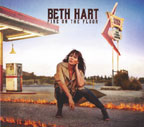 Beth
Hart
Beth
Hart
Fire on the Floor
Provogue 2016
“Fire on the Floor” is a follow-up to Beth Hart’s well-received
previous album, 2015’s “Better Than Home.” The Los Angeles-born
singer has a formidable voice that she deploys on a set of eclectic tunes,
all of which she wrote. Her cohort of musicians has changed completely,
with no loss of competence. In fact, among them are several deservedly
renowned names: Ivan Neville and Jim Cox on keyboards, and Waddy Wachtel,
Dean Parks, and Michael Landau on guitars. Brian Allen on bass, Rick Marotta
on drums, and Oliver Leiber on various instruments round out the basic
crew, embellished by horns on one track.
Surprisingly from a woman whose roots are in rock, the set opens with
“Jazz Man,” introduced by delicious tinkly piano. Those who
hear echoes of 1980s Rickie Lee Jones in Hart’s vocal stylings:
so do I, and we will also encounter them again in subsequent tunes. Hart,
like Jones, favors passion and attitude, changes in tempo, forays up and
down the scale, and occasional phrasing slightly off the beat, all adding
verve to her approach. The effervescent pop tune “Let’s Get
Together” epitomizes the resemblance to Jones.
“Fat Man,” in contrast, melds rock and blues in an ode to
the enticements and ravages of dope, Hart singing convincingly in front
of crunching guitars; I envision John Mellencamp some day covering this
tune. The immediately ensuing title track slows the tempo as Hart demonstrates
her capability both to croon and rasp; it’s one of my favorite cuts
of the set. The ensemble goes slow again with “Woman You’ve
Been Dreaming Of,” distinguished by some further fine piano work,
and then the gospel-like “Good Day to Cry.”
Those who wish for a respite from the vocal intensity of most numbers
may like “Coca Cola,” a love song that compares her lover’s
flavor to that iconic beverage. For me, it’s one of the few weak
spots of the set: too treacly, and in concept too complimentary of an
unhealthy drink marketed by a multi-tentacled multinational corporation
with dubious social conscience. Oops, my politics are showing. Even so,
I’ll give Hart a pass, because the remainder of the almost hour-long
outing is a worthy showcase for her singing and songwriting talents.—Steve
Daniels
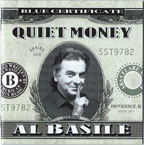 Al
Basile
Al
Basile
Quiet Money
Kenoza/Sweetspot 2017
Why do you listen to music? For the music, obviously! It’s a fair
bet that many of us listen literally to the music - the melody, harmony,
rhythm, syncopation - and, especially in our electronic age, when we listen
via radio, home sound system, or smartphone, we don’t discern or
even care about the lyrics of most songs.
Well, don’t cheat yourself: listen to Al Basile’s lyrics.
The man has something to say, and a wise and witty way of saying it. A
master cornetist and perennial Blues Music Award nominee for Horn Player
of the Year, Basile was a writer before he became a musician, and is a
published poet and playwright. This follow-up to 2016’s “Mid-Century
Modern” continues his string of top-notch albums, again accompanied
by the usual suspects from his days with the famed Roomful of Blues. They
deserve to be cited: Duke Robillard, of course, on guitar; Mark Teixeira
and Brad Hallen on drums and bass respectively, Bruce Bears on piano,
and the horn trio of Doug James, Rich Lataille, and Jeff Chanonhouse.
Basile acknowledges inspiration from Lowell Fulson, Jimmy McCracklin,
Tampa Red, and several jazz swing bands, but the set commences with an
oxymoron: a jaunty lament for the cultural and financial state of the
genre, “Blues Got Blues.” Sorry, Al, but if you and your buddies
continue playing it like this, blues has a rosy future.
The nearly hour-long set has plenty of variety: we get straight blues,
rockers, jump blues, swing, sultry jazz, a little of everything. Throughout
the musicianship is stellar, with Robillard providing lots of pristine
and unobtrusive guitar leads. Basile‘s tenor vocals go down smoothly
as well. Still, what elevates this album above the merely excellent is
the lyrics…fully provided in the copious liner notes by Basile himself.
Sample these, from “Wrong to Be Right”:
Sometimes it’s smarter not to win
If you want to have a chance to play again
The game’s a lot bigger than either side
Gotta do what it takes to keep the game alive
Along the way we get some words of love, wry observations on human nature,
and satirical cajoling. This is a fine CD that warrants close and repeated
listening; the rewards are many.—Steve Daniels
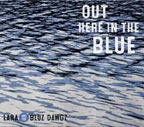 Lara
and The Bluz Dawgz
Lara
and The Bluz Dawgz
Out Here In The Blue
Lock Alley Music
laraandthebluzdawgz.com
Lara and The Bluz Dawgz are six working musicians who moved to Nashville
to fulfill their dreams. They’ve been running together since 2012
led by Lara Dean Germony, who studied classical voice and her partner
Gregg Germony from Buffalo, NY, a session bassist, keyboardist Daniel
Nadasdi from Ontario, New York guitarist Al Rowe with three CD’s
under his own name, Carlos Ruiz originally from New Mexico, graduated
from Berklee College of Music, is an in-demand drummer, and rounding out
the band hailing from New Orleans is sax/B3 organist Reggie Murray who
also wrangles the Dawg Pound horns with Stuart Naylor trumpet, Chuck Lyons
trombone and Eric Walker bari sax. “Out Here In The Blue”
is the Dawgs third CD, includes eleven originals with all members sharing
writing credits, each member is given a chance to lead while maintaining
a pack mentality to play bluz their way.
The Dawgs swing into a comfortable groove with “Easy Come, Easy
Go” Lara’s voice has a sweetness with a touch of tremolo as
each member takes a turn as top dawg. Reggie’s sax moans on the
smoky piano lounge number “Out Here In The Blue” Al heats
things up on guitar between Lara’s sultry verses. Then the tempo
picks up as her straightforward lyrics about a relationship that’s
moving too fast when you “Do What You Do” as guitar and sax
alternate solos, things take a jazzy turn behind a stinging guitar as
she defiantly sings “Catch Me If You Can.” Dropping down into
a blues ballad the vocal is tense and sad as she admits that “Love
Slips Away” as the guitar cries, the sax sighs in response. The
guitar breaks in with an angry tone as Lara briskly sings with a touch
of sadness, baby just “Walk Away” as the band plays out some
mean blues. Breaking in with a cross between “Shotgun” and
“Soul Man” as her man gives her trouble, Lara haughtily tells
him he’s asking the “Wrong Question” and sends him out
the door. As Lara steps out to take a “Smoke Break,” the band
jumps in with a joyous instrumental jam on piano, a burning guitar and
Reg takes turns on both sax and B3. After that break the band plays sprightly
till Lara finds that old heartache knocking at her door again, the guitar
pleads and the horn section sighs and moans and she wistfully says, here
it comes again, baby “Where You Been.” Opening that door the
thrill heats up as the guitar hits a boogie beat and the ivories tickle
her fancy, Lara realizes her man is rock solid and he’s “Custom
Made” for me, then in the mellow afterglow of “Moonlight”
she knows her baby’s home.
Lara and The Bluz Dawgz is a seasoned band with just enough roughness
to make “Out Here In The Blue” their own kind of Bluz.—Roger
& Margaret White
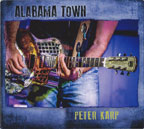 Peter
Karp
Peter
Karp
Alabama Town
Rose Cottage Records 2017
Born in New Jersey, raised at various times in the New York City, Alabama,
and South Carolina environs, Peter Karp absorbed multiple musical influences
throughout his childhood. His musical career began in the 1980s but was
put on hiatus for a decade while he dealt with a serious family illness.
He’s been back delivering blues and roots music for a number of
years now, drawing on his eclectic background and a host of notable musical
friends. Among the latter is Canadian singer-guitarist Sue Foley, with
whom he produced two recent well-received albums.
His new outing sports another extensive lineup of collaborators, among
whom are Garth Hudson of The Band, harmonica ace Dennis Gruenling, and
former Rolling Stones guitarist Mick Taylor. The rotating cast delivers
a solid hour of thirteen songs displaying Karp’s songwriting facility,
as well as his skills on guitar and piano.
The title tune kicks things off, a fond reminiscence of Karp’s southern
roots with his stinging guitar licks prominent. “Till You Get Home”
is a rock shuffle with inspirational advice on what to do “when
you’re one hand short of a wild card”; it’s a piano-driven
tune that had me up and dancing. The ensuing cut, “That’s
How I Like It,” is a mid-tempo talking rocker (is that possible?)
with nasty guitar that evokes the style of George Thorogood; in my opinion,
it’s the only low spot of the set, with its sophomoric lyrics about
swaggeringly disdaining rules and conventions. Redemption follows quickly
with “Blues in Mind,” Karp again slinging guitar leads adeptly
over some wiser, rueful lyrics.
Speaking of guitar leads…Mick Taylor slides in (pun intended) on
the next two numbers, and he and Karp mesh nicely. So do Karp and Gruenling,
who provides tasty mouth harp as Peter deploys his electric resonator
guitar on “The Prophet,” a country blues. “Kiss the
Bride” segues into straight country, with Karp and Leanne Westover
in a delicious vocal duet. “Nobody Really Knows” shows that
the main man can dabble creatively in some six string jazz fingerpicking.
Continuing in an eclectic vein, “Lost Highway” mines the gospel
genre, with choice background vocals and juicy piano work, presumably
by Karp. “Y’all Be Lookin’ “ is a mid-tempo rocker
with some of the best guitar work on the disc, followed by the meditative
“I Walk Alone,” with Hudson contributing accordion and John
Zarra mandolin. The set ends with a short but powerful and doleful “Beautiful
Girl,” Karp on acoustic guitar and Gruenling on harp blending well.—Steve
Daniels
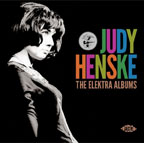 Judy
Henske
Judy
Henske
The Elektra Albums
Ace CD
With her banjo in tow, bluesy contralto belter Judy Henske arrived on
L.A.’s Sunset Strip in 1960 and the region’s, then quite laid-back,
folk music scene has never really recovered from the impact she made.
Quickly signed to visionary Jac Holzman’s fledgling Elektra label
(where she was soon joined by the likes of Tim Buckley, Fred Neil and
Phil Ochs) the Queen of the Beatniks released two astounding albums, in
1963 and 1964 respectively. Both collected here in all their elemental
glory accompanied by great life-path liners by Kris Needs, that close
thusly: “This reissue captures a time when Judy Henske was a force
of untamed nature in the safe folk world, maybe too big for the era then
unfolding outside.” How true. Personal favorites across both LPs
are her “agonizingly haunted” recall of Bessie Smith’s
tour-de-force “Empty Bed Blues,” a “starkly supernatural”
version of the Underground Railroad coded spiritual “Wade In The
Water,” her “spaciously jazzy” rendition of Billy Edd
Wheeler’s “High Flying Bird” (the blueprint for folk-rock)
and the traditional blues/folk-rocking “I Know You Rider”—that
predicts the Byrds. And then there’s the murder ballads and a couple
of tracks of stand-up patter “honed while warming up hard-bitten
crowds waiting for Lenny Bruce.” Crime writer Andrew Vachss puts
it this way: “If Linda Ronstadt is a torch singer, Henske’s
a flame thrower.” Amen.—Gary von Tersch
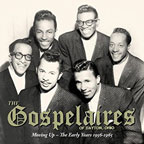 The
Gospelaires of Dayton, Ohio
The
Gospelaires of Dayton, Ohio
Moving Up—The Early Years 1956-1965
Gospel Friend CD—PN-1512
www.gospelfriend.comThe photo on the back cover of this set’s CD
booklet says it all. Being a sidewalk shot, from the early 1960’s,
of the marquee of the famed Apollo theater—listing gospel giants
James Cleveland, the Staple Singers and the Mighty Clouds of Joy alongside
the Gem City’s “hard-singing” Gospelaires. Indeed, when
many male quartets found it hard to make a living in that mass-chorus
and organ-led gospel groups-focused era, the Melvyn Pullen and Clarence
Kendricks-organized Gospelaires were not only performing at the Apollo
but on nationally-syndicated television and to “enthusiastic audiences
throughout Europe,” as ace researcher Robert M. Marovich puts it.
This well-curated round-up of some of the group’s most rousing sides
begins with an early single, recorded in 1956 for the tiny Avant label—a
mournful “Some People Never Stop To Pray” features a high
tenor lead vocal and doo-wop harmonizing while the flip side,”We
Are Marching Together,” possesses a rhythmic lyricism redolent of
Julius Cheeks’ Sensational Nightingales. A year later the two groups
were label-mates as Don Robey, owner of the major independent, Peacock
Records, based in Houston, Texas, signed the hard-whooping, dynamic Gospelaires
on the spot after hearing them. With various configurations, they remained
with Peacock for the next sixteen years, touring in Gospel packages constantly
to promote their records. After Robey’s death in 1976, they signed
with Savoy Records and managed to release four albums before being cut
loose—the handwriting was on the wall for quartets on both radio
and record. Hello James Cleveland! This 29 track, seventy minute project,
in addition to that nascent single features a variety of their finest
sides from the period when they had really refined their animated, clef-leaping
sound. Hard to pick favorites here but don’t miss their arresting
renditions of sanctified standards on the order of “Motherless Children,”
“I’ll Be So Glad,” “Search Me Lord” and
“He Heard My Cry” and hard-driving originals like “Ride
This Train,” “Mother’s Journey,” “Sit Down
Children” and a pair authored by Frank Peoples—“Joy,
Joy, Joy” and “When I Rise.” A heady glimpse of one
inspired corner of gospel’s golden age. Hats off to producer Per
Notini!—Gary von Tersch
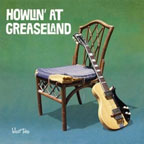 Howlin’
At Greaseland
Howlin’
At Greaseland
Various Artists
West-Tone CD—1708
Cleanly and clearly recorded at Kid Anderson’s hot Greaseland Recording
Services “home” studio in San Jose, California and featuring
a top shelf California and Chicago cast of both aged veterans and emerging,
pretty much local, artists, this generous 14 track tribute project successfully
channels and vividly recollects the frenzied intensity of the charismatic
force-of-nature known as Chester Burnett aka Howlin’ Wolf in music
as well as oral history. The talented, Bay Area-based blues “wrecking
crew” includes the likes of multi-instrumentalist and co-recording
maestro Anderson, Jim Pugh, Rick Estrin, Rockin’ Johnny Burgin,
Alabama Mike, Terry Hanck, Johnny “Cat” Soubrand, John Blues
Boyd and June Core among others while the Windy City is represented by
a couple of veteran vocalists—Taildragger and Henry Gray—who
both have deep personal and professional ties to the Wolf. Taildragger
began singing in the early 70s under Wolf’s rigorous mentorship
and eventually had a career performing his material as well as his own,
while 92 years young Gray played piano on many of Wolf’s most noteworthy
recordings. They each take the reins on two songs apiece (Taildragger
with “I’m Leaving You” and “Don’t Trust
No Woman” and Gray with “Little Red Rooster” and “Worried
Life Blues”) with the remaining vocals split among various band
members. Favorites among the latter are a couple featuring Boyd (Wolf
classics “Smokestack Lightnin’“ and a glorious version
of “Riding In The Moonlight”), Hanck’s positively caustic
recall of “Howlin’ For My Darlin’“ and Alabama
Mike’s tone-setting, raucous rendition of “Meet Me In The
Bottom,” that opens affairs. Scattered throughout are a few brief
unguarded anecdotes about the Wolf, with Hanck’s tale about a supermarket
parking lot concert leading the way. Dynamite stuff. Play loud!—Gary
von Tersch
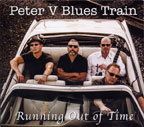 Peter
V Blues Train
Peter
V Blues Train
Running Out of Time
Petervbluestrain.com
Peter V’s early dreams were of being a musician. He earned his first
guitar selling newspapers and spent his youth in bands, but laid his guitar
down in the ‘80s. When trouble smacked him in the face he pulled
out his trusty instrument and took to the bars to work out his demons.
His recently released “On Track” CD is still getting airplay
but with more original material he’d like to share Peter has followed
up in quick succession with another self-released project entitled, “Running
Out Of Time.” This collection of original tracks has his unique
fusion of jazz, blues and rock and some interesting makeovers of choice
covers. Peter is the engine and driving force behind this journey with
alumni Blues Train crew members Alex D’Agnese on drums, Aron Louis
Gornish on keys, Sean Graverson on bass and includes several guest players
who’ve come along for the ride.
Horns blaring like train whistles announce the Blues Train’s arrival.
They’re augmented by extra keyboards of Jeff Levine and the sax
of Danny Walsh, adding fuel to the fire on the first three cuts. Peter
confidently declares that he’ll “Stay On Track” as his
vocal follows the clipped chugging rhythm of his Train. Chilling from
this clamor and swinging into a lounge cover of “Cherry On The Cream,”
V’s cool vocals whip the jazzy overtones of sweet sax flowing over
keys that heat up enough to bust loose with a woeful wail of sax as Peter
cries I’m “Buzzed Busted & Blue” from the bottom
of his soul. The core band returns giving Big Maceo’s “Worried
Life Blues” a more contemporary flare while Peter’s guitar
mimics the intensity of his gritty vocals with a burning solo then the
title track surges through a blues attack of guitar while Peter agonizes
over “Running Out Of Time” while playfully dreaming he was
the “Youngblood” of Lieber and Stoller’s classic. Another
cover is Bonnie Raitt’s “Love Me Like A Man.” V invites
Kelley Dewket to sing while Gary Neuwirth blows harp but it’s the
Train’s acoustic guitar and ringing keys that carry the weight.
A stunning opening guitar recedes behind Peter’s emotional vocals
while dueling guitars weaving between verses of the heartbreaking reality
that “Freedom” may mean being alone. With double tracked acoustic
guitars Peter sadly sings “Time For Me To Go” then the band
pays tribute to the late Michael Packer, known as the Blues Ambassador,
V picks up that torch with a blazing finale on “Lay Down My Friend”
then pays his dues on the funky instrumental “Time To Collect”
and fulfilling his dreams of playing in the band.
The Peter V Blues Train has created an interesting fusion of blues and
jazz making “Running Out Of Time” timely indeed.—Roger
& Margaret White
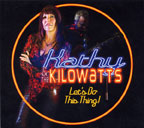 Kathy
& the Kilowatts
Kathy
& the Kilowatts
Let’s Do This Thing!
KathyMurrayandtheKilowatts.com
Kathy Murray was an army brat in 1968 when her family settled in Austin,
Texas, a budding live music capital. Murray’s passion for music
was sparked by the energy she witnessed from local musicians like Jimmie
and Stevie Ray Vaughan, national heroes like Freddie King and other diverse
regional influences. Following in the footsteps of Texas blues women like
Lou Ann Barton and Angela Strehli, Murray matches them in toughness while
adding a sweetness with a trilling vibrato to her sound. The Kilowatts
is a family affair that includes her band leader husband, Bill “Monster”
Jones on guitar, adding bass and accordion where called for and brother
David Murray on guitar, bass and percussion, both on backup vocals with
Dylan Cavaliere on upright bass, Jeff Botta bass or organ, Richard Ross
and Nina Singh sharing percussion with Dan Torosian playing soprano, tenor
or baritone sax and Al Gomez on trumpet and flugelhorn. This line-up and
Kathy’s songwriting skills have come together to release fourteen
original electrifying tracks on “Let’s Do This Thing!”
Getting this ‘thing’ going with a Texas-style shuffle on “Call
Me Mrs. Blues” with her husband leading the band on guitar she really
is Mrs. Blues. Touring those wide open spaces of Texas brings on a tale
of long distance love that has Kathy wistfully “Talking Out My Head”
during “These Lonely Hours” on the road. With the band stripped
down to a trio and steady drums rapping for “Love Came Knocking”
against Murray’s sweet come-hither vocals. A laid-back uncomplicated
arrangement Kathy warns “One Lie Leads to Another” then with
a shuffle she deals him a blow saying “Read ‘Em & Weep”
she’ll draw a better man. “Beautiful Moments” is a horn-heavy
recreation of the glory days of Duke and Peacock Records’ soulful
Texas blues while the horns and guitar drive Kathy to coo that “Each
Kiss” powers her love even stronger and “Spell It Out”
to I-L-O-V-E-Y-O-U. With a simple acoustic guitar Murray sings I don’t
need you but “I Want To” share your life with me. One of the
most powerful songs, a Tex Mex mother’s lament “10 Most Wanted”
about an unwanted child becoming a wanted man. A change of pace, the title
tune, “Let’s Do This Thing,” has an ‘80s vibe
of deep fuzz and trebly breaking-glass lead guitar with vocals, a cross
between Pat Benatar and Chrissy Hynde. The band adds vocal beat boxing
to a rockabilly reverb guitar and baritone sax on “Exception To
The Rule” while “Loveaholic” is a straight up slap back
bass rockabilly rabble-rouser.
Kathy & the Kilowatts is a true Austin,Texas treasure and their new
CD “Let’s Do This Thing!” is the real thing.—Roger
& Margaret White
BOOKS
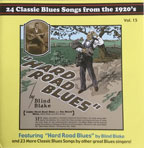 Classic
Blues Artwork From The 1920’s Calendar With CD
Classic
Blues Artwork From The 1920’s Calendar With CD
Blues Images
www.bluesimages.com
For the 15th consecutive year, John Tefteller’s enterprising Blues
Images operation presents their always eagerly anticipated calendar/CD
project and, for the third year in a row, has teamed up with the American
Epic folks who put together an entrancing four-part documentary on rural
American music from the 1920s and 1930s, that aired on both PBS and BBC
Worldwide earlier this year—showcasing the same type of classic
blues that the calendar visually introduces, month by month. Plus, the
Epic team employs their revolutionary system to digitally restore old
78 rpm records—resulting in markedly less surface noise and a wider
dynamic range. 2018’s CD highlights, among the 24 tracks, includes
a pair of recently discovered titles by Jab Jones and the Memphis Jug
Band (“My Love Is Cold” and “Poor Jab Blues”)
along with a fresh remastering of Tommy Johnson’s Paramount 12975
(“Slidin’ Delta” and “I Wonder To Myself”)
as well as Johnnie Temple’s Vocalion 02987 (“Evil Devil Blues”/“Jacksonville
Blues”) taken from newly unearthed, cleaner copies of both discs.
Further must-hears begin with a couple of stand-out songs by Blind Lemon
Jefferson (an odd “Hot Dogs” and it’s B-side “Weary
Dogs Blues”), a New Orleans field trip recording by Blind Willie
Johnson (“God Moves On The Water”), that reflects on the Titanic’s
ill-fated passengers, and both sides of Charley Patton’s debut blues
disc, Paramount 12805 (“Screamin’ And Hollerin’ The
Blues”/“Mississippi Boweavil Blues”), whose initial
pressing gave him the moniker The Masked Marvel. Other musicians featured
include Tampa Red and Thomas Dorsey, The Beale Street Sheiks (their final
recording), Reverend Steamboat Bill’s Revival Singers and the lively
duo of Memphis Minnie and Kansas Joe, among other gems. Happy New Year!—Gary
von Tersch
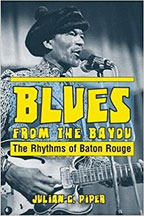 Blues
From The Bayou—The Rhythms Of Baton Rouge
Blues
From The Bayou—The Rhythms Of Baton Rouge
by Julian Piper
Pelican Press
www.pelicanpub.com
Dedicated to the “memory of my friend Rockin’ Tabby Thomas,
king of the Louisiana swamp blues,” Englishman Julian C. Piper’s
easy reading, image-laden softcover volume transports the reader back
to the late 1980’s—an era when Thomas’ Blues Box And
Heritage Hall (so-named to enable him to legally serve liquor) in Baton
Rouge was well past its 50s and 60s heyday yet still the remaining
focal point of a thriving but decidedly under-the-radar blues scene. While
pursuing a degree in American and Commonwealth Arts at Exeter University
as well as backing up visiting American bluesmen like Eddie Kirkland,
Lefty Dizz, Lazy Lester and Carey and Lurrie Bell with his Junkyard Angels
blues band throughout Europe, Piper coaxed his advisors into suggesting
a year of study as an exchange student at LSU in Baton Rouge—where
Tabby “Hoodoo Party” Thomas not only welcomed him to the Blues
Box’s fabled stage but also, at times, facilitated candid, far reaching
“life and times” interviews with the likes of Silas Hogan,
Arthur “Guitar” Kelly, Record Man J.D. Miller and Lonesome
Sundown, among others, along with collecting an abundance of colorful
reminiscences about the area’s blues legends—I’m talking
Slim Harpo, Lightnin’ Slim, Robert Pete Williams, Lazy Lester (who
invited Piper to visit Baton Rouge in the first place), Leadbelly, James
“Butch” Cage, Henry Gray, Buddy Guy, Guitar Slim, Little Walter,
Moses “Whispering” Smith (the list goes on) from local musicians
who knew them, often from boyhood. Essential chapters, often full of “insider
facts,” focus on the ins and outs of the record business with Crowley-based
Record Man Miller, early hit-makers Slim Harpo and Lightnin’ Slim,
disillusioned Lonesome Sundown as well as both Raful and Kenny Neal, with
the former’s memories of Little Walter in the early days particularly
revealing. Akin to the rest of this diary-like musical history. And, as
Piper notes, the gritty, swamp blues-influenced tradition is still alive
and thriving in the music of Tab Benoit, Chris Thomas King and Kenny Neal.
Highly recommended and love that photo of Keith Richards hugging Slim
Harpo! —Gary von Tersch
Home
/ Blues Blogs /
Artist Links / Blues
Links / Videos / Store
Subscribe / Advertise
/ Back Issues
/ Contact / Staff